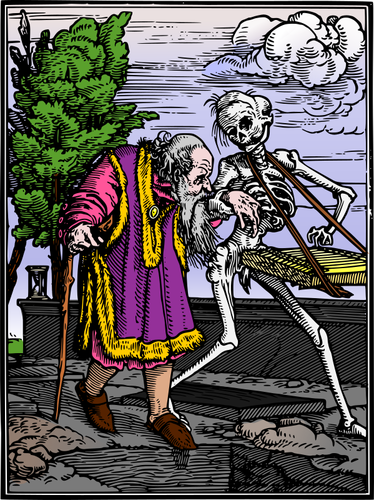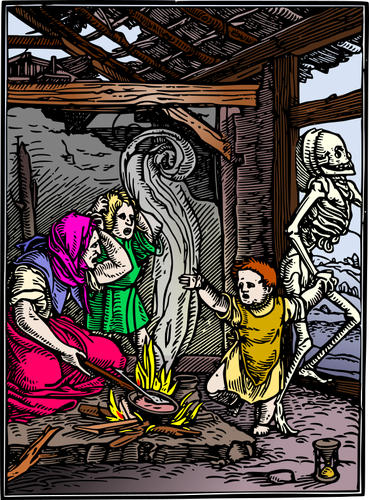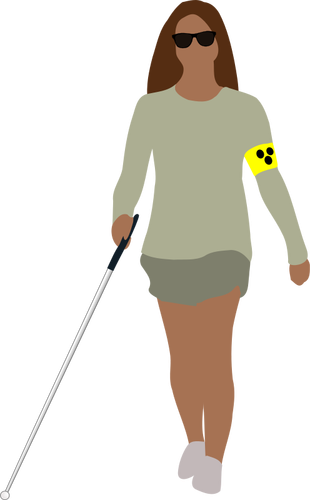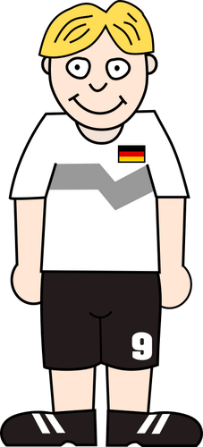14 9-5: Adjectival Nouns
9-5: Adjectival Nouns
9.5: Adjectival Nouns
English sometimes substitutes in an adjective sort of like a noun. We call these adjectival nouns.
- The sick need good medical insurance.
- The poor have nothing to eat.
German does this too…but more often than in English.
- Die Kranken brauchen eine gute Krankenversicherung.
- Die Armen haben nichts zu essen.
 As previously mentioned, German uses these more often than in English.
As previously mentioned, German uses these more often than in English.
- Die Alte isst jeden Tag in einem teuren Restaurant.
- The old (woman) eats every day in an expensive restaurant.
In this example, it doesn’t sound so good in English, but it sounds perfectly natural in German.
Frage: But how do I know whether to use masculine, feminine, or neuter for the definite article (or indefinite article)?
Antwort: Make the sentence as if you were going to put the word for the actual person in there…then leave it out.
- Die alte Frau isst jeden Tag in einem teuren Restaurant.
- o (Now take out the word “Frau” and capitalize “alte,” and you’ve got a grammatically correct example of an adjectival noun)
- Die Alte isst jeden Tag in einem teuren Restaurant.
- o (Now take out the word “Frau” and capitalize “alte,” and you’ve got a grammatically correct example of an adjectival noun)
Noch mehr Beispiele:

Der Alte spricht mit dem Tod.
VS.
Ein Alter spricht mit dem Tod.
Frage: Why do these examples have different adjective endings?
Antwort: Remember that der-words and ein-words have different endings in the nominative case for masculine! Look on the review chart in Section 7-3 to double-check. When in doubt, add the word Mann to each example to remind yourself about why it needs an adjective ending→ Der alte Mann/ein alter Mann.

Die Alte läuft Schlittschuh und hat ein altmodisches Handy.
VS
Eine Alte läuft Schlittschuh und hat ein altmodisches Handy.
Fortunately for us, der-words and ein-words have the same ending in feminine for the nominative case→-e. However, if you need help remembering the ending, add back in the word Frau to your example to remind you: die alte Frau/eine alte Frau.

Das Kleine versteckt sich im Garten.
VS
Ein Kleines versteckt sich im Garten.
Once again, if you wonder why the endings are different, look back to your adjective endings chart to see that nominative neuter has different endings for der– and ein-words. When in doubt, add in the word Kind to your sentence: das kleine Kind/ein kleines Kind.

Die Kleinen spielen Schach.
VS
Unsere Kleinen spielen Schach.
Luckily for us, plural in all cases for both ein– and der-words have the same ending→-en. As always, if you have trouble, put in the word Kinder to remind you of which adjective ending to use→ die kleinen Kinder/unsere kleinen Kinder.

![]()
Wegen der Pest holte der Tod das Kleine.
VS
Wegen der Pest holte der Tod ein Kleines.
The same thing applies in the accusative case. Neuter has a different ending based on whether it is a definite or indefinite article. When in doubt, add back in the word Kind to remind yourself which ending it needs→das kleine Kind/ein kleines Kind.

![]()
Die Elefanten verprügeln den Armen!
VS
Die Elefanten verprügeln einen Armen!
Whether definite or indefinite article, the ending is the same in the accusative case. Add in Mann to remind you of the adjective ending→den armen Mann/einen armen Mann.

Wir sprachen mit der Blinden, die sich zu uns setzte.
VS
Wir sprachen mit einer Blinden, die sich zu uns setzte.
Either way, feminine dative has the same adjective endings with definite and indefinite articles. Feel free to add in the noun to remind yourself that it has an –en ending→mit der blinden Frau/mit einer blinden Frau.
The good news is that everything in dative and genitive will use the same –en ending that it did in previous chapters for adjective endings. It’s a good review of adjective endings, which students often forget or get mixed up.
Some nationalities function as adjectival nouns:

Ein Deutscher sagte, “Ist das Kunst, oder kann das weg?“
Der Deutsche trägt im Sommer Sandalen mit Socken.
Es gibt eine Deutsche, die an unserer Uni studiert.
Frag doch mal die Deutschen, ob sie lieber Kaffee oder Tee zum Frühstück trinken.
Once again, it depends on the noun that would have come after the adjective to determine what ending it gets→ein deutscher Mann/der deutsche Mann/eine deutsche Frau/die deutschen Leute…usw.
Here is a few other common words that are adjectival nouns:
- der/die Bekannte—acquaintance
- der/die Verwandte—relative
- der/die Deutsche—German person
- der/die Erwachsene—grownup
- der/die Jugendliche—youth
Watch to see me reteaching this:
Ex. A: Adjektivierte Substantive. Beschreiben Sie die Bilder mit adjektivierten Substantiven. Schreiben Sie Beispiele im Nominativ, Akkusativ und Dativ.

Beispiel:
→Nominativ: Der Arme hat kein Geld.
→Akkusativ: Ich kenne den Armen nicht.
→Dativ: Sollten wir dem Armen Geld geben?
KULTURECKE: Weihnachten in Deutschland! (Courtesy of Claudia Kost & Crystal Sawatzky, University of Alberta).
(Add slides) https://pressbooks.openeducationalberta.ca/willkommen-deutsch/chapter/5-9/
QUICK LISTENING: Listen to Sonja, AudioLingua, tell about one special Christmas.
- Warum was dieses Weihnachtsfest besonders schön?
- Wer war bei ihr zu Weihnachten?
- Was hat die Familie zusammen gemacht?
- Was hat Sonja geschenkt bekommen?
- Wohin ist die Familie gegangen?
- Vergleichen Sie Ihr Weihnachtsfest mit der von Sonja. Was ist ähnlich oder unterschiedlich?







